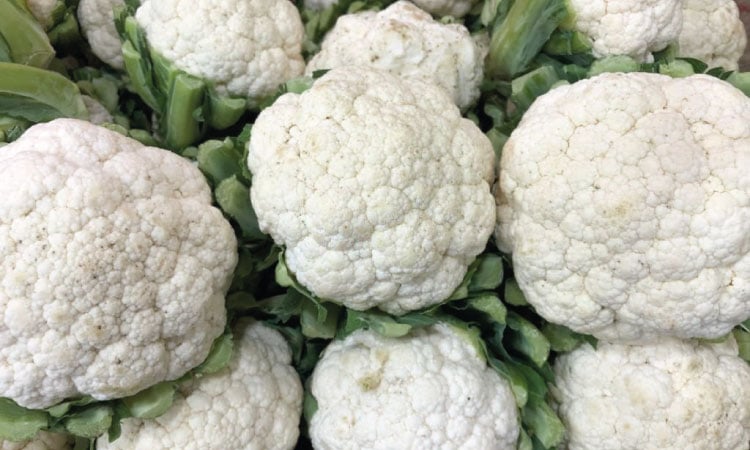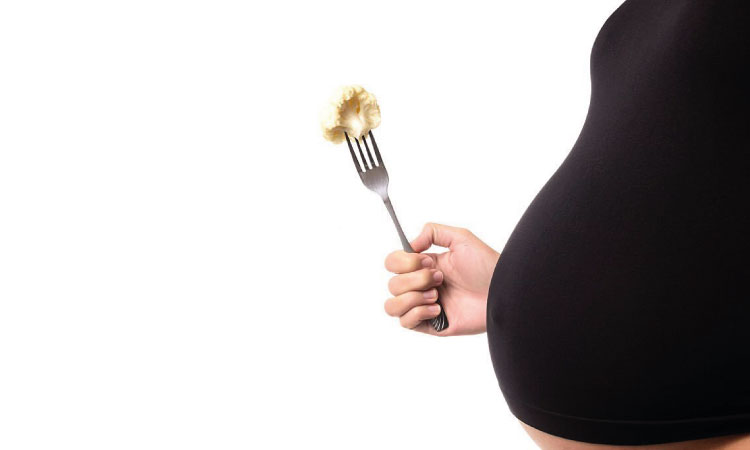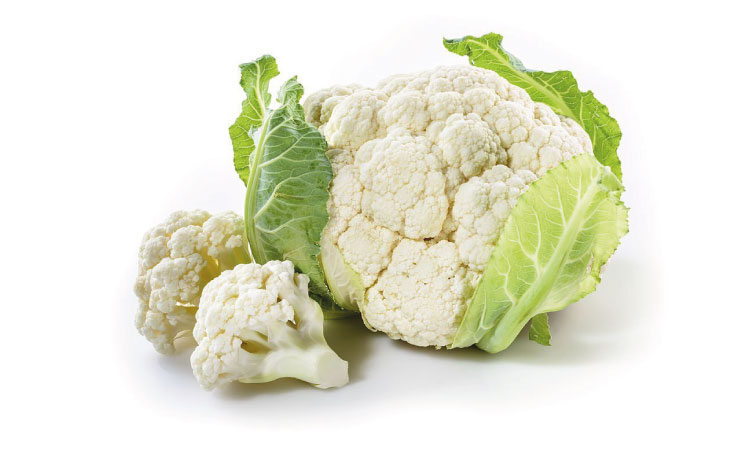Pregnancy is a very important and delicate time in a woman’s life. If not handled properly, it could lead to a wide variety of problems. What you eat can have a significant impact on how your pregnancy progresses. Therefore, be sure to enjoy this time period with a healthy diet. It’s imperative that you switch to a healthy diet if you’re a junk food addict. Cauliflower is one of these superfoods during pregnancy. Let’s analyze the risks and rewards of consuming cauliflower during pregnancy.
The Nutritional Profile Of Cauliflower
Cauliflower boasts a remarkably high nutritional profile. Cauliflower has few calories and a wealth of vitamins. Cauliflower is a good source of nearly every essential vitamin and mineral.
Take a look at the nutritional breakdown of 1 cup of raw cauliflower, which is equal to 128 grams as per a source:
- Calories: 25
- Fiber: 3 grams
- Vitamin C: 77% of the RDI
- Vitamin K: 20% of the RDI
- Vitamin B6: 11% of the RDI
- Folate: 14% of the RDI
- Pantothenic acid: 7% of the RDI
- Potassium: 9% of the RDI
- Manganese: 8% of the RDI
- Magnesium: 4% of the RDI
- Phosphorus: 4% of the RD
Is It Safe To Eat Cauliflower During Pregnancy?
When deciding whether or not to consume a specific food while pregnant, it is important to take into account the food’s nutritional value, safety, cost, availability, and potential risks. Numerous foods fall into the “must include” category for pregnant women. One food that fits this description is cauliflower.
Pregnant women may benefit from eating cauliflower because of the high levels of beneficial minerals and vitamins it contains. These include potassium, folate, magnesium, vitamin C, vitamin B, and calcium.
Related Reading: How To Stay Hydrated During Pregnancy?
However, gas formation is possible after eating cauliflower because it is a cruciferous vegetable (part of the cabbage family) and contains many sulphur compounds. It is important to keep this in mind before having cauliflower during pregnancy. The consumption of cauliflower should be limited during pregnancy, especially for those who are more prone to intestinal gas.
Benefits Of Consuming Cauliflower During Pregnancy

The high nutritional content of cauliflower makes it one of the world’s most popular superfoods, even when pregnant. It’s an excellent source of fiber, as well as vitamins B and C. The antioxidant carotenoids and the anti-inflammatory glucosinolates are both abundant in this food. The following are some of the top benefits of cauliflower during pregnancy.
Calculate Due Date With LMP
1. Improves cardiovascular health
In order to have a healthy pregnancy, your heart must remain healthy. Maintaining normal blood pressure requires healthy blood vessels. Inadequate heart pumping or an increase in blood pressure during pregnancy can have unfavorable consequences.
Cauliflower contains antioxidants like sulforaphane and glucoraphanin that have anti-inflammatory properties and helps reduce oxidative stress, as well as total cholesterol and LDL levels. It is high in fiber and omega-3 fatty acids, both of which help keep blood vessels flexible and lower bad cholesterol.
Because of its high glucoraphanin content, cauliflower is a good food to eat regularly during pregnancy if you want to improve your blood flow and keep your blood vessels healthy. The conversion of glucoraphanin into isothiocyanates activates anti-inflammatory properties that prevent lipid accumulation in the blood vessels1. This can aid in the unobstructed flow of blood to the growing fetus.
2. May assist in improving iron absorption
There is a significant increase in the risk of anemia during pregnancy. It is not surprising because the volume of the mother’s blood grows by approximately 50% during pregnancy.
Having a severe case of iron deficiency anemia while pregnant raises the likelihood of having a baby born prematurely. The risks of preeclampsia, premature delivery, and a low birth weight baby are all increased in the presence of iron deficiency anemia during pregnancy2. It is important to include iron-rich food in a pregnant woman’s diet.
Related Reading: 11 Foods That Give You Energy While Pregnant
The leaves of cauliflower are very high in iron3. Further iron absorption is enhanced by the presence of vitamin C in cauliflower. This can help to increase the production of hemoglobin in the body. This reduces the risk of anemia during pregnancy.
3. Cauliflower during pregnancy strengthens bone
Pregnant women’s bone health requires extra care. Increasing bone density is essential to ward off osteoporosis in the future. If a pregnant woman doesn’t get enough calcium, her unborn child will steal it from her bones. Hence it is imperative to include calcium rich foods in your pregnancy diet.
Cauliflower contains vitamin C. The amount of vitamin C in the body is associated with bone density.
Also, it may contain a fairly good amount of vitamin K, which increases bone mineral density4. It is high in phosphorus, which aids in the development of strong bones in both mother and her developing child.
4. Contribute to electrolyte balance
Certain electrolyte imbalances can put the life of the fetus in danger by putting the mother’s life in danger. An example is a hypokalemia5. The potassium content in cauliflower may help in maintaining the electrolyte balance in the body. Together, the sodium and potassium in this food keep pregnant women from getting dehydrated by maintaining their fluid levels.
5. Improve immunity
A pregnant woman’s immunity will be compromised, making her susceptible to infection. It is a must to boost your immunity during pregnancy. Cauliflower contains an abundance of antioxidants and immune-boosting nutrients. Along with other healthy components in cauliflower, vitamin C can inhibit infections and strengthen the body’s defenses by limiting disease-causing inflammation.
6. Other benefits of eating cauliflower during pregnancy
- For pregnant women who need to watch their weight, cauliflower is a healthy option because of its low-calorie count
- Cauliflower’s high folate content aids the developing placenta of the fetus. It also contributes to the baby’s healthy neural development and prevents neural tube defects
- Cauliflower’s vitamin content promotes cell growth, which aids in the development of the baby. Other minerals like sodium zinc, phosphorus, and manganese in cauliflower also contribute to fetal development
Related Reading: 7 Nutritional Benefits Of Kale During Pregnancy And 6 Ways To Eat It
Risks And Side Effects When Consuming Too Much Cauliflower During Pregnancy

Cauliflower poses some potential health hazards to pregnant women, despite the fact that it is a versatile vegetable with significant nutritional value. In addition, excessive consumption of cauliflower may have some undesirable side effects.
Cauliflower during pregnancy and thyroid
The secretion of thyroid hormones may be inhibited by consuming cruciferous vegetables like cauliflower. Many phytonutrients, found in cauliflower, have been linked to a variety of health benefits. But one of these phytonutrients, isothiocyanates, can interfere with iodine absorption.
Consuming raw cruciferous vegetables such as cabbage and cauliflower can further impair thyroid hormone production if your diet is deficient in iodine or if you have an underactive thyroid, also known as hypothyroidism6.
Cauliflower can contribute to bloating and flatulence
Consuming foods that are high in fiber may lead to an increase in bloating as well as flatulence. Cauliflower, like all cruciferous vegetables, contains a complex sugar called raffinose. Since it is difficult for the human digestive system to process this sugar, it goes to the large intestine undigested, where bacteria ferment it, resulting in bloating and gas7.
However, most people can tolerate these foods in moderate portions. When consumed in moderation, however, these foods are generally well tolerated by the majority of people.
Related Reading: 9 Best Home Remedies For Gas During Pregnancy
Cauliflower during pregnancy can interact with blood thinning medicines
Pregnant women with a history of DVT (blood clots in the deep veins of the body) or autoimmune diseases may be given medicines that thin the blood. Consuming large amounts of cauliflower can counteract the blood-thinning effects of certain medications8.
May contribute to kidney stone
Because of the purine content of cauliflower, eating too much of this vegetable can cause a rise in uric acid levels9. Kidney stones and gout are just a few of the complications that can arise from this. Due to cauliflower’s high purine content, pregnant women who are prone to gout, kidney stones, and uric acid buildup should avoid consuming it.
Cauliflower can cause allergy
Extremely few people are allergic to cauliflower. They develop an allergic reaction characterized by hives, swelling of the face and hands, and difficulty breathing. However, in extremely rare cases, people who are allergic to cauliflower may experience life-threatening anaphylaxis9. If you find out you have an allergy, stay away from cauliflower.
Risk of pesticide residue
Farmers use several rounds of pesticide spray on cauliflower10. These harmful compounds are still present in the veggies many days after harvesting. Many of these pesticides include neurotoxins and may cross the placenta, causing genetic changes.
So, if your source of cauliflower is likely to be high in pesticide residue, try to find a reputable organic supply. This allows you to get all of the advantages of cauliflower while avoiding the hazards.
Possible contamination risk
A large number of insects and insect residue can be found in cauliflower and could be accidentally consumed if the vegetable is not properly cleaned and washed before consumption. It may be infested with worm larvae, which are typically too small to be seen by the naked eye.
Never eat raw cauliflower during pregnancy. Cauliflower can cause stomach irritation and food-borne diseases like toxoplasmosis and listeriosis if eaten raw or unwashed and uncooked.
Cauliflower and constipation
Cauliflower, like other members of the cruciferous vegetable family, contains complex sugars that can be difficult for some people to digest. If you suffer from constipation, eating cauliflower may make your symptoms worse. It would not be a good idea for a pregnant woman to eat cauliflower if she is already experiencing constipation.
Related Reading: Amla During Pregnancy – How Much, How To, Benefits And Side-Effects
Precautions While Eating Cauliflower During Pregnancy

Cauliflower is a superfood that, when selected and consumed properly, can be the ideal vegetable for pregnant women. Following the below-mentioned safety measures, you can safely incorporate it into your diet and reap the nutritional benefits throughout your pregnancy.
- Cauliflower should be thoroughly washed and inspected for bugs and worms before being used in any dish. After you cut the cauliflower into florets, wash them in warm salt water to get rid of any lingering bugs or worms. It also aids in the removal of dirt and pesticides. Soaking the cauliflower florets in turmeric water is another option for getting rid of worms and larvae
- The consumption of cruciferous vegetables should not be discontinued in the event of hypothyroidism. The goitrogenic properties (that disrupt the use of iodine and thus the production of thyroid hormones) are greatly diminished through cooking or steaming
- Limit your daily intake of cruciferous vegetables to no more than one small bowlful
- In case you have an allergy to raw cruciferous vegetables, like cauliflower, try cooking them first. Cooking cauliflower reduces the effort required by the digestive system to break it down
- If you crave cauliflower curry during pregnancy, make sure you eat it in the morning to aid digestion and absorption. For maximum nutrient retention and minimal digestive burden, cook it briefly with a few seasonings and oil
According to Our Nutritionist, Sushree, Overall the available research evidence suggest that consuming cauliflower during pregnancy is safe and offers valuable nutritional benefits for both mother and the growing fetus. However practice moderation and listening to your body, as individual experiences may vary. Also the most important practice to remember is prioritize prevention methods and safe consumption. Always prioritize your and your growing fetus health when making consumption decisions – as pregnancy is a very crucial period.
FAQs
Consuming cauliflower will not result in a miscarriage on its own. Toxoplasmosis and listeriosis, which can increase the risk of miscarriage, are more likely to occur if safety protocols are not followed properly while eating cauliflower during pregnancy.
Color and firmness are the two most important characteristics to consider when selecting the best cauliflower. Look for cauliflower that has clean, tightly bundled, creamy white florets and bright green leaves. Florets that are yellow, spotted, and have limp leaves are more likely to be spoiled. Dark patches indicate downy mildew, a type of omycetes or water mold.


